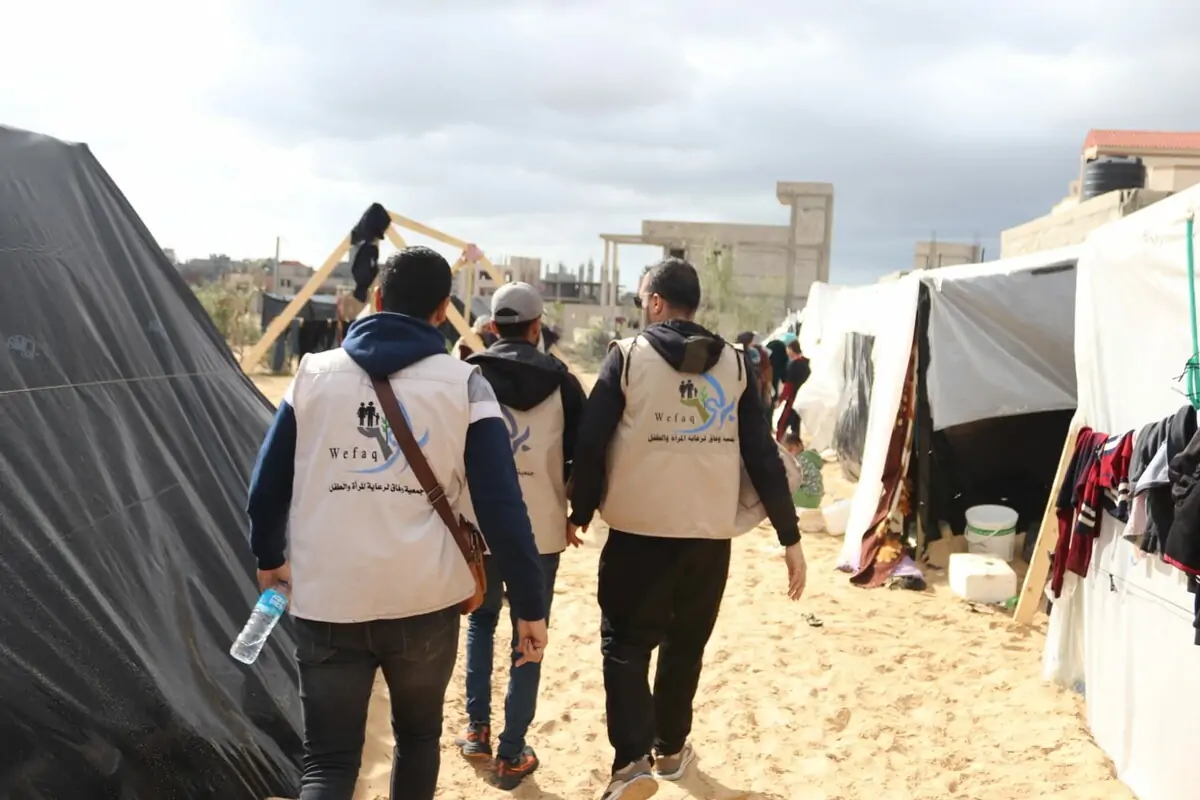ActionAid has been working in the occupied Palestinian territory since 2007, partnering with local women- and youth-led groups to support the most marginalized and vulnerable people. Yet, this war is unlike any other that our colleagues and partners have faced. Limited aid supplies are making it from Egypt into Gaza, while aid distribution has largely stopped due to the intensity of hostilities and restrictions of movement. In the face of such complex challenges to providing sufficient relief, it’s never felt more critical that we honor our partners’ courage and their steadfast commitment to justice and peace.
Two of our partners, the Al-Awda Hospital and WEFAQ Women and Childcare Association, have been doing exceptional work and we want to give you the opportunity to listen to their firsthand accounts of what it feels like to be in Gaza, trying to survive a war and take care of people, at the same time.
Al-Awda, a hospital in Northern Gaza, has been navigating challenge after challenge, like not having enough fuel or medical supplies to function in addition to being the target of bombing campaigns in late November, during which three doctors were killed and two surgical departments were destroyed. The hospital has continued to come under intense attack, leaving staff struggling to save lives amid near-impossible conditions.
Despite these powerful blows, the hospital has continued to treat the sick and injured. It is the only remaining hospital in the north that provides maternity services, and – against all odds – has been delivering babies, conducting orthopedic operations, and saving lives, even with medical supplies and equipment running dangerously low.
On Monday, December 18th, we learned that Dr. Ahmed Muhanna, the manager of Al-Awda, had been arrested by the Israeli military and taken to an unknown location. Other staff members at the hospital were also detained before being released. Snipers continue to surround the hospital and people have been unable to leave or enter for the past two weeks. ActionAid is calling for the immediate release of Dr. Muhanna and all other healthcare staff, so that they can continue to provide life-saving care for their patients.
Listen to Dr. Ahmed Muhanna, prior to his arrest, describe the host of challenges that have been accelerating and complicating life-saving operations within the hospital in the past few weeks:
“The hospital staff are working 24 hours a day. We haven’t had fuel…we shut down the generators…we are working now on LED lights and battery charges. But the services are still running in Al-Awda.”
While the Israeli military has been pushing deeper into southern Gaza, its attacks in the north have not subsided, and have included attacks on health facilities. Most of Gaza’s hospitals are now completely out of commission and tens of thousands of people are being denied their fundamental right to healthcare. As attacks continue on hospitals in Gaza, ActionAid’s position remains clear: hospitals are safe havens. They are protected under international humanitarian law and should never, ever be a target.
WEFAQ, Women and Child Care Association, is another ActionAid partner responding in Gaza. An organization based in Rafah, WEFAQ implements women protection initiatives, women and youth-led training for crisis response, and social and economic resilience programs. Right now, their focus is offering psychosocial support to children who have been affected by the crisis in Gaza and legal counselling to women who have suffered from gender-based violence. As a result of the war (and the 16-year blockade put in place prior to the war), psychologists at WEFAQ are treating cases in children that are associated with living on the frontlines of poverty and violence, like bed-wetting, violent outbursts, poor attention span, difficulty concentrating, and nightmares. They do this through “psychosocial drama activities” – singing, drawing, and dancing – which help children express their stories and encourage them to talk about what they’ve gone through. They are one of the only centers in Gaza providing these kinds of services for young people throughout the war.
In addition to being a source of psychosocial support and refuge for children and women, WEFAQ has provided hot meals, winter clothing, and dignity kits to thousands of families who have been displaced by the war. They also continue to conduct needs assessments in camps for internally displaced people in Rafah and Khan Younis (in the south), to ensure that ActionAid is responding to emergent needs.
Listen to Buthaina Subeh, director of WEFAQ, share how this war feels different than any other conflict Palestinians have experienced:
“We live a life without life.”
ActionAid is planning to step up our response and distribute thousands more hygiene kits, meals, and winter clothing in the coming weeks. We will continue to advocate for a permanent ceasefire, adequate humanitarian aid to be delivered through a sustained humanitarian corridor, and the upholding of safety, rights, and dignity of Palestinians.
